
Sophie's Choice is a 1979 novel by American author William Styron. The author's last novel, it concerns the relationships among three people sharing a boarding house in Brooklyn: Stingo, a young aspiring writer from the South, Jewish scientist Nathan Landau, and his lover Sophie, a Polish-Catholic survivor of the German Nazi concentration camps, whom Stingo befriends.
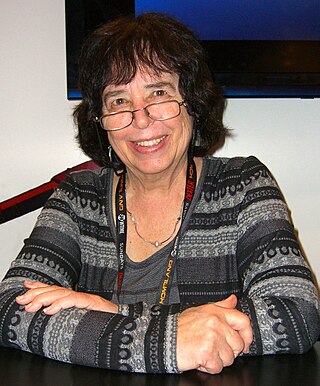
Jane Hyatt Yolen is an American writer of fantasy, science fiction, and children's books. She is the author or editor of more than 350 books, of which the best known is The Devil's Arithmetic, a Holocaust novella. Her other works include the Nebula Award−winning short story "Sister Emily's Lightship", the novelette "Lost Girls", Owl Moon, The Emperor and the Kite, and the Commander Toad series. She has collaborated on works with all three of her children, most extensively with Adam Stemple.
The Holocaust has been a prominent subject of art and literature throughout the second half of the twentieth century. There is a wide range of ways–including dance, film, literature, music, and television–in which the Holocaust has been represented in the arts and popular culture.
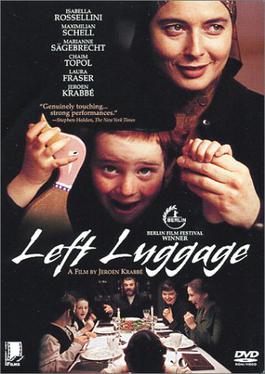
Left Luggage is a 1998 Dutch film directed by Jeroen Krabbé.

Arnošt Lustig was a renowned Czech Jewish author of novels, short stories, plays, and screenplays whose works have often involved the Holocaust.

The Boy in the Striped Pyjamas is a 2006 historical novel by Irish novelist John Boyne. The plot concerns a German boy named Bruno whose father is the commandant of Auschwitz and Bruno's friendship with a Jewish detainee named Shmuel.

Anne Frank and Me is a 2001 novel by husband and wife writing team Cherie Bennett and Jeff Gottesfeld. Inspired by the life of Anne Frank, it follows a teenage girl named Nicole Burns who travels back in time to 1942 and inhabits the body of a Jewish Holocaust victim. The novel was adapted from a play written and directed by Bennett in 1996.

Briar Rose is a young adult novel written by American author Jane Yolen, published in 1992. Incorporating elements of Sleeping Beauty, it was published as part of the Fairy Tale Series of novels compiled by Terri Windling. The novel won the annual Mythopoeic Fantasy Award for Adult Literature in 1993. It was also nominated for the Nebula Award for Best Novel.
Shmuel Yaakov Weinberg, known as Yaakov Weinberg was an Orthodox Jewish rabbi, Talmudist, and rosh yeshiva (dean) of Ner Israel Rabbinical College in Baltimore, Maryland, one of the major American non-Hasidic yeshivas. Weinberg was also a rabbinical advisor and board member in Haredi and Orthodox institutions such as Torah Umesorah, Agudath Israel of America and the Association for Jewish Outreach Programs.
Nishmat is a Jewish prayer that is recited during Pesukei D'Zimrah between the Song of the Sea and Yishtabach on Shabbat and Yom Tov. It is also recited during the Passover seder.

The Boy in the Striped Pyjamas is a 2008 Holocaust historical drama film written and directed by Mark Herman. It is based on the 2006 novel of the same name by John Boyne. Set in Nazi-occupied Poland, the film follows the son of a Schutzstaffel officer who befriends a Jewish prisoner of his age. It was released in the United Kingdom on 12 September 2008. It received generally positive reviews from critics for being touching but was panned by scholars for misrepresenting elements of the Holocaust.
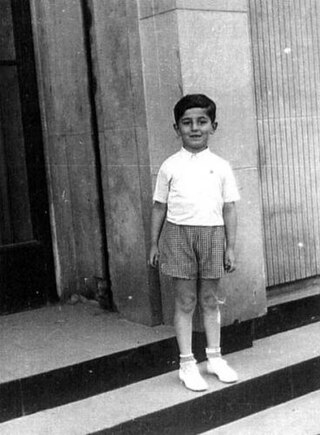
Henio Zytomirski was a Polish Jew, who was murdered at the age of 9 in a gas chamber at Majdanek concentration camp during the German Nazi occupation of Poland. Henio became an icon of the Holocaust, not only in Lublin but all over Poland. His life story became a part of the curriculum taught in the general education system in Poland. The "Letters to Henio" project has been held in Lublin since 2005. Henio Zytomirski is one of the heroes of "The Primer" permanent exhibition at barrack 53 of the Majdanek Museum, an exhibition dedicated to children held in the camp.

The Devil's Arithmetic is a 1999 TV movie based on the historical novel of the same name by Jane Yolen. It stars Kirsten Dunst as Hannah Stern and costars Brittany Murphy, Louise Fletcher, and Mimi Rogers. Dustin Hoffman introduces the film but is uncredited and serves as an executive producer with Mimi Rogers.
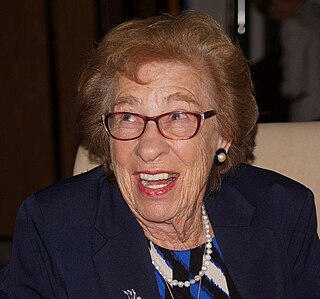
Eva Schloss is an Austrian-English Holocaust survivor, memoirist and stepdaughter of Otto Frank, the father of Margot and diarist Anne Frank. Schloss speaks widely of her family's experiences during the Holocaust and is a participant in the USC Shoah Foundation's Visual History Archive project to record video answers to be used in educational tools.
Rywka Lipszyc was a Polish-born Jewish diarist and Holocaust survivor. She was deported to Auschwitz-Birkenau concentration camp followed by a transfer to Gross-Rosen and forced labor at its subcamp in Christianstadt. She was then taken on a death march to Bergen-Belsen, and was liberated there in April 1945. Too ill to be evacuated, she was transferred to a hospital at Niendorf, where the record of her life ended.
Robin Saex Garbose is an American filmmaker and theatre director. Following an early career directing several off-Broadway plays and episodes of the shows Head of the Class and America's Most Wanted, Garbose embraced Orthodox Judaism and founded the Kol Neshama Performing Arts Conservatory, a summer camp and arts conservatory providing an artistic outlet for teenage Orthodox girls. With Kol Neshama, she has produced several projects, including the films A Light at Greytowers (2007), The Heart That Sings (2011), and Operation: Candlelight (2014). Her projects have been screened at the Museum of Tolerance, the Menachem Begin Heritage Center, the Jerusalem and Tel Aviv Cinematheques, and the Atlanta Jewish Film Festival.
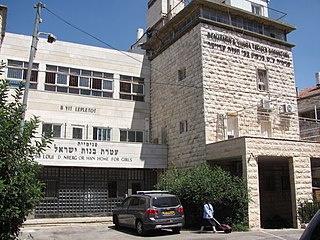
Bayit Lepletot, is an Orthodox Jewish orphanage for girls in Jerusalem, Israel. Established in 1949 in the Mea Shearim neighborhood to accommodate young Holocaust refugees and orphans, the orphanage opened a second campus in north-central Jerusalem called Girls Town Jerusalem in 1973. Over time, the resident profile changed to comprise girls from dysfunctional or abusive homes, children of terror victims, and abandoned immigrant children. Girls enter the orphanage as young as three years of age and can remain at the home until their wedding. The orphanage takes full responsibility for each girl's welfare and covers all living, educational, and wedding expenses. As of 2004, the two campuses had housed and educated over 8,000 girls.

Nebula Awards Showcase 2018 is an anthology of science fiction and fantasy short works edited by American writer Jane Yolen. It was first published in trade paperback and ebook by Pyr in August 2018.
Yitzchak Zelig Morgenstern of Kotzk-Sokolov was an Admor and Rosh yeshiva, a member of the Moetzes Gedolei HaTorah and a leader of Polish Jewry before the Holocaust, who died shortly after the war began.













